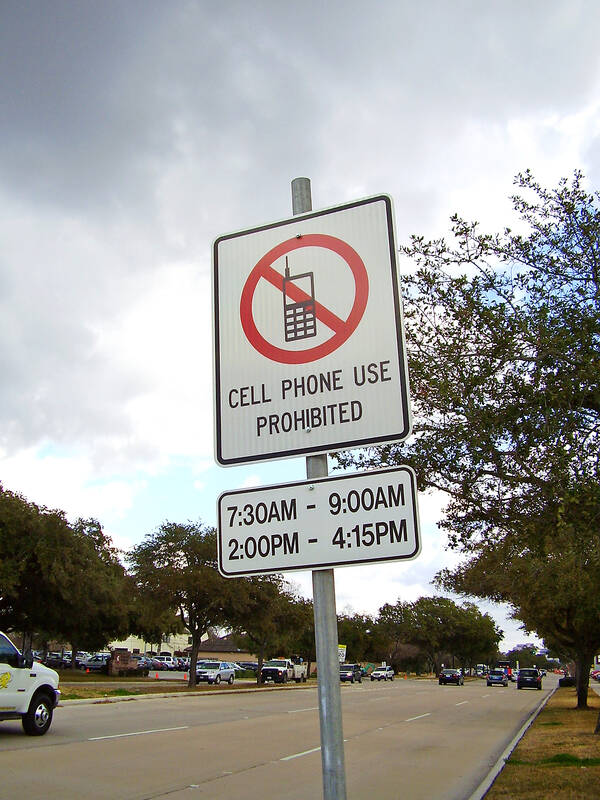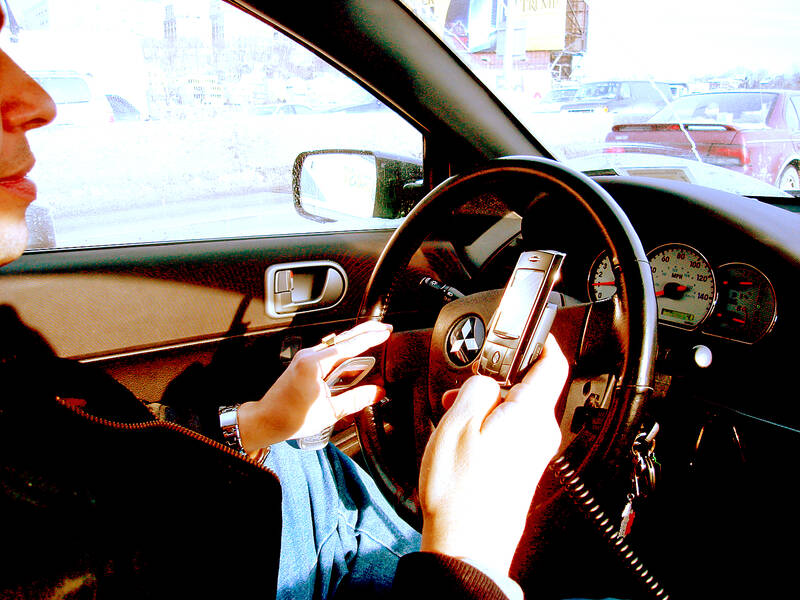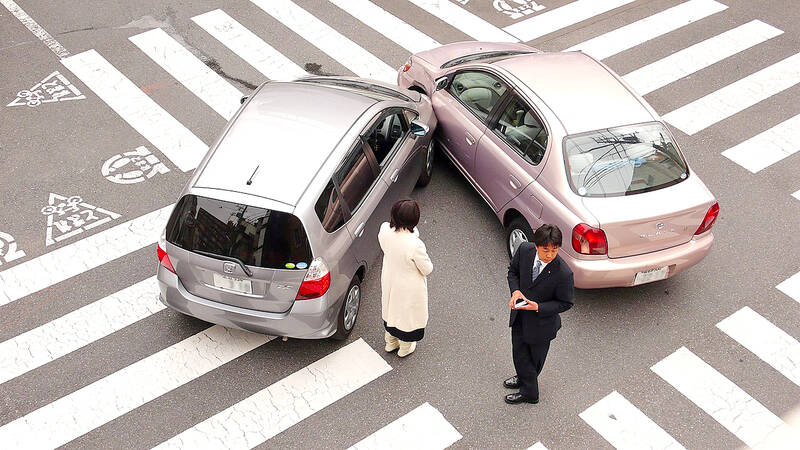The photograph didn’t lie. There I was in the driver’s seat of my car, stopping at the lights, with one hand on the wheel, the other on my lap and holding my mobile phone.
There was nothing to mitigate in my favor. Not the phone addiction we all have. Not my urgent impulse to check who was calling even though I didn’t intend to answer. I was good for it, your honor. I copped the five demerit points that put me perilously close to a three-month licence suspension. I’m now a much more prudent driver (not that I felt I was ever particularly reckless, though I would argue that of course) — slower, more cautious entering intersections and careful never to go near my phone.
Given the terrible annual road toll and its dreadful human carnage in many countries, the need for strict rules and punishments is irrefutable. The momentary lapse of concentration can be lethal.

Photo courtesy of Wikimedia Commons
Mobile phones are, indeed, a danger to everyone on the roads. But I’ve been struck recently (especially since losing those five demerits) by just how many other potentially lethal driver distractions there are.
I live very close to a busy arterial thoroughfare. The streets of my suburb turn into crawling, aggro-filled rat-runs every morning as drivers use the side streets to avoid the lights on this thoroughfare and shave a few minutes off the commute. I see every sort of appalling driver behavior daily. Pedestrians — dog-walkers, kids and old people among them — abused and nearly run over. Every morning my streets host frightening episodes of road rage and shouted threats of violence, as drivers hoon the wrong way up and down lanes and streets to get to the lights and turn first.
And then there are the dangers posed by so many other distractions that drivers subject themselves — and everyone else — to.

Photo courtesy of Wikimedia Commons
Twice recently as I’ve walked with my dogs I’ve seen the same person (silver BMW) reading the same novel, perched over the steering wheel, while slowing down ahead of the red light and waiting for it to turn green. Given that in-real-life death is for a very, very long time indeed, this particular popular Australian novel is not worth dying for. Then again, it’s not entirely worth living for either, in a kind of life-is-far-too-short way, if you know what I mean.
What about the woman (green Range Rover) doing her makeup? I don’t mean while stopped at the lights. No, I’m talking about doing it while crawling along said major thoroughfare. And when I say doing her makeup, I don’t mean touching up her lipstick. I’m talking foundation and eyeliner on the dash. This is her daily routine.
Then there are those people, telephones attached to holders on the dash, who are clearly watching cat videos or Antiques Roadshow or Midsomer Murders (again, remember how short life is and then spare another thought about truly dumb ways to die).

Photo courtesy of Wikimedia Commons
I’ve always had the horrors at seeing dogs tethered on the back of a pickup truck. Once on a Victorian highway a long time ago I saw a dog, tethered with too much leash and distracted by another animal in an adjacent car, jump from the back and ... you can imagine the rest. The sight is with me still. The driver careened off the highway on to the verge, narrowly missing another car, when he realized what was happening to his unfortunate animal.
Dogs in cars (particularly in the front seat) can be massively distracting. Especially if, like one of my local rat-run drivers, you are brushing the canine while it sits on your lap. While you are driving a moving vehicle.
Doing one’s hair (combing/brushing) in the rear-view is an oldie, of course, and as potentially hazardous, it would seem, as the huntsman spider that falls on to your lap when you pull down the sun visor. So, too, making a Windsor knot in your tie while negotiating a right-hand turn.
Then there is eating and drinking. The piece of Vegemite toast in the same hand as the wheel and sips of steaming coffee at the red light may be perilous enough. But what about the guy (white Tesla) eating some sort of cereal? From a cup held in one hand? With a spoon in the other? And, therefore, no hands on the wheel.
The Australian national road toll is no joke. Road accidents cause untold misery and catastrophic death rates. I’ve rightly been put on notice for the phone use. And since then I’ve really come to notice how many other dangerous distractions there are, just how dangerous it is out there — and how blase so many drivers are.

On April 26, The Lancet published a letter from two doctors at Taichung-based China Medical University Hospital (CMUH) warning that “Taiwan’s Health Care System is on the Brink of Collapse.” The authors said that “Years of policy inaction and mismanagement of resources have led to the National Health Insurance system operating under unsustainable conditions.” The pushback was immediate. Errors in the paper were quickly identified and publicized, to discredit the authors (the hospital apologized). CNA reported that CMUH said the letter described Taiwan in 2021 as having 62 nurses per 10,000 people, when the correct number was 78 nurses per 10,000

As we live longer, our risk of cognitive impairment is increasing. How can we delay the onset of symptoms? Do we have to give up every indulgence or can small changes make a difference? We asked neurologists for tips on how to keep our brains healthy for life. TAKE CARE OF YOUR HEALTH “All of the sensible things that apply to bodily health apply to brain health,” says Suzanne O’Sullivan, a consultant in neurology at the National Hospital for Neurology and Neurosurgery in London, and the author of The Age of Diagnosis. “When you’re 20, you can get away with absolute

May 5 to May 11 What started out as friction between Taiwanese students at Taichung First High School and a Japanese head cook escalated dramatically over the first two weeks of May 1927. It began on April 30 when the cook’s wife knew that lotus starch used in that night’s dinner had rat feces in it, but failed to inform staff until the meal was already prepared. The students believed that her silence was intentional, and filed a complaint. The school’s Japanese administrators sided with the cook’s family, dismissing the students as troublemakers and clamping down on their freedoms — with

As Donald Trump’s executive order in March led to the shuttering of Voice of America (VOA) — the global broadcaster whose roots date back to the fight against Nazi propaganda — he quickly attracted support from figures not used to aligning themselves with any US administration. Trump had ordered the US Agency for Global Media, the federal agency that funds VOA and other groups promoting independent journalism overseas, to be “eliminated to the maximum extent consistent with applicable law.” The decision suddenly halted programming in 49 languages to more than 425 million people. In Moscow, Margarita Simonyan, the hardline editor-in-chief of the